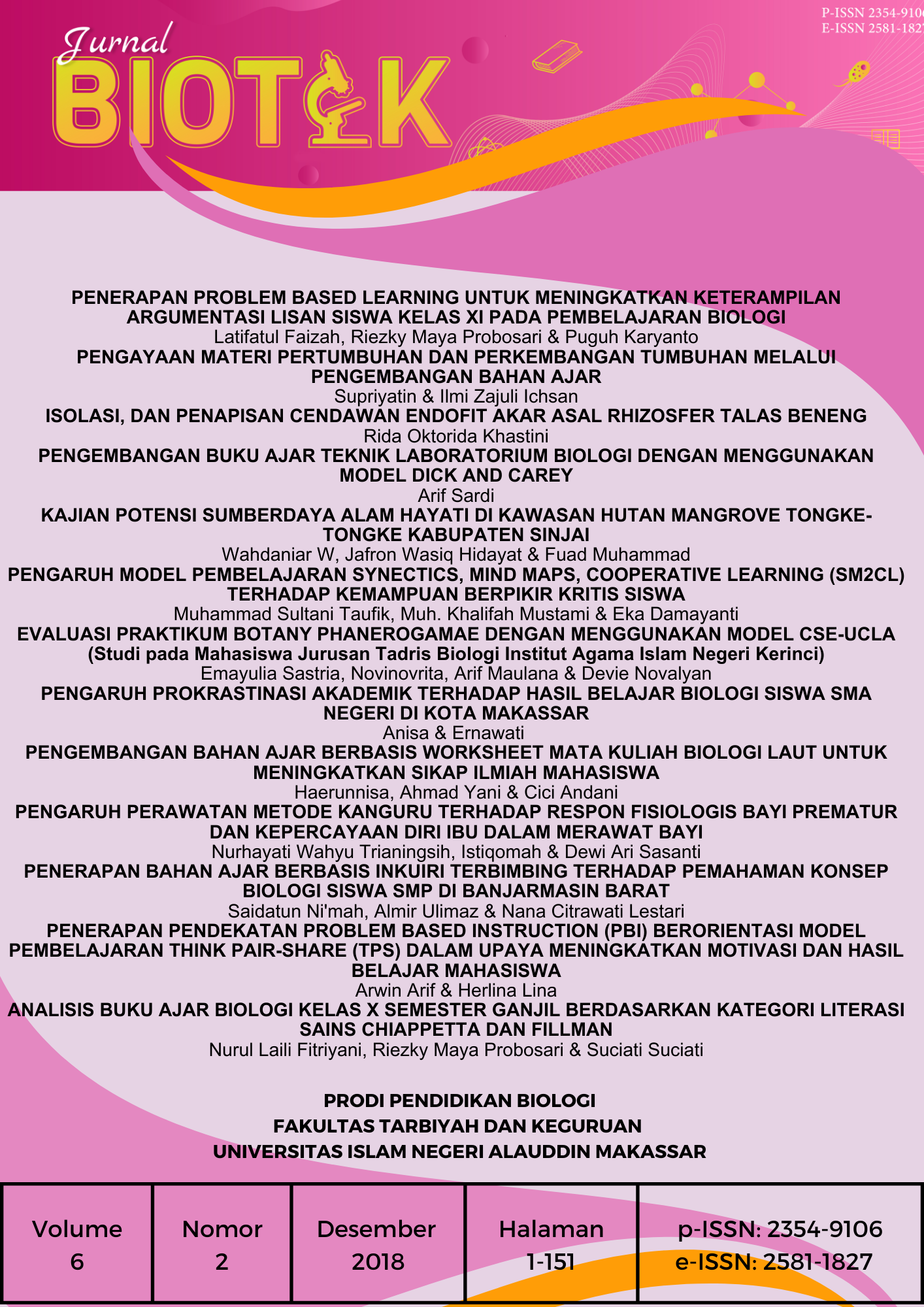ISOLASI, DAN PENAPISAN CENDAWAN ENDOFIT AKAR ASAL RHIZOSFER TALAS BENENG
Abstract
Kebutuhan pangan nasional dapat dilakukan upaya diversifikasi pangan yaitu pemanfaatan kelompok umbi-umbian seperti Talas Beneng (Xanthosoma undipes K.Koch) yang merupakan salah satu jenis flora umbi-umbian khas Provinsi Banten. Produktivitas talas beneng dapat ditingkatkan yaitu salah satunya dengan menggunakan pupuk hayati mengandung mikroorganisme hidup yang bermanfaat. Penelitian ini bertujuan untuk mengisolasi dan melakukan penapisan terhadap cendawan endofit akar asal rhizosfer talas beneng sehingga dapat dikembangkan lebih lanjut sebagai pupuk hayati untuk meningkatkan produktivitas talas beneng. Sebanyak 19 isolat cendawan berhasil diisolasi melalui teknik isolasi langsung dan pengumpanan. Hasil identifikasi menunjukkan jenis cendawan dari genus Acremonium, Aspergillus, Aureobasidium, Curvularia, Fusarium, Penicillium, Paecilomyces, Trichoderma, dan beberapa isolat yang belum teridentifikasi. Berdasarkan hasil penapisan diperoleh sebanyak 12 isolat merupakan cendawan endofit akar dan 5 isolat merupakan cendawan parasit akar.
Kata Kunci: Cendawan endofit akar, talas beneng, rhizosfer
Downloads
References
Baldani JI, Caruso L, Baldani VLD, Goi SR, Döbereiner J. 1998. Recent advances in BNF with non-legume plants. Soil Biol Biochem 29:911-922.
BPTP Banten. 2015. Kisah Sukses Kampung Domba Terpadu. http://banten.litbang.pertanian.go.id/ind/index.php?option=com_content&view=article&id=373:kampung-ternak-domba-juhut-banten&catid=12:koran&Itemid=12.
Chuang C-C, Yu-Lin K, Chao CC, Chao WL. 2006. Solubilization of inorganic phosphates and plant growth promotion by Aspergillus niger. Bio Fertils Soil: 140-147.
Kemenhut. 2013. Statistik Kehutanan Indonesia. Kementerian Kehutanan. Jakarta.
Leksono S. M. & Firdaus N. 2008. Analisis vegetasi mangrove di Cagar Alam Pulau Dua Serang sebagai habitat burung. [laporan Penelitian: Hibah Dosen Muda DP2M Ditjen Dikti Depdiknas].
Paul NC. 2007. Diversity of endophytic fungi of medicinal plants in Korea and their antifungal and plant growth promot-ing activity. Masters thesis,
Chungnam National University, Daejeon, Republic of Korea
Petrini O, Sieber TN, Toti L, Viret O. 1991. Ecology Metabolite Production and Substrate Utilization in Endophytic Fungi. Natural Toxins 1:185-196.
Rommert AK, Oros-Sichler M, Lange T, Aust HJ, & Schulz B. 2002.Growth promoting effect of endophytic colonization of larch seedlings (Larix decidua) with Cryptosporiopsis sp. and Phialophora sp. In: Book of Abstracts, the Seventh International Mycological Congress. P. 309 University of Oslo, Oslo.
Schadt CW, Mullen RB, Schmidt, SK. 2001. Isolation and phylogenetic identification of a dark-septate fungus associated with the alpine plant Ranunculus adoneus . New Phytologist 150, 747 – 755
Sinclair JB, Cerkauskas RF. 1996. Latent infection vs. endophytic colonization by fungi. Di dalam : Redlin SC, Carris LM. Endophytic Fungi in Grasses and Woody Plants : Systematics, Ecology and Evo-lution. Aps. Press The American Phytopathological Society St. Paul. Minnesota. 23-29
Usuki F, Narisawa K, 2007. A mutualistic symbiosis between a dark septate endophytic fungus, Heteroconium chaetospira, and a nonmycorrhizal plant, Chinese cabbage. Mycologia. 99(2):175-184
Varma A, Verma S, sudha, Sahay N, butehorn, Franken P. 1999. Pirimospora indica, a cultivable plant growth promoting root endophyte. Appl Environ Microbiol 65(6):2741-2744.
Wennstrom A. 1994. Endophyte - the misuse of an old term. Oikos 71:535-536.
Wilson D. 1995. Endophyte – the evolution of a term, aFnd clarification of its use and definition. Oikos 73: 274-276.
Zulfitri A. 2007. Pengaruh Cendawan Endofit Akar Dan Mikoriza Arbuskula (CMA) Terhadap Pertumbuhan Jarak Pagar (Jatropha Curcas Linn.) [skripsi]. Bogor: Fakultas Matematika dan Ilmu Pengetahuan Alam, Institut Pertanian Bogor.
Copyright (c) 2018 Rida Khastini

This work is licensed under a Creative Commons Attribution-ShareAlike 4.0 International License.
Authors who publish with Jurnal Biotek agree to the following terms: Authors retain the copyright and grant Universitas Islam Negeri Alauddin Makassar right of first publication with the work simultaneously licensed under a Creative Commons Attribution License (CC BY-SA 4.0) that allows others to share (copy and redistribute the material in any medium or format) and adapt (remix, transform, and build upon the material) the work for any purpose, even commercially with an acknowledgement of the work's authorship and initial publication in Universitas Islam Negeri Alauddin Makassar. Authors are able to enter into separate, additional contractual arrangements for the non-exclusive distribution of the journal's published version of the work (e.g., post it to an institutional repository or publish it in a book), with an acknowledgement of its initial publication in Universitas Islam Negeri Alauddin Makassar. Authors are permitted and encouraged to post their work online (e.g., in institutional repositories or on their website) prior to and during the submission process, as it can lead to productive exchanges, as well as earlier and greater citation of published work (See The Effect of Open Access).

This work is licensed under a Creative Commons Attribution-ShareAlike 4.0 International License.



